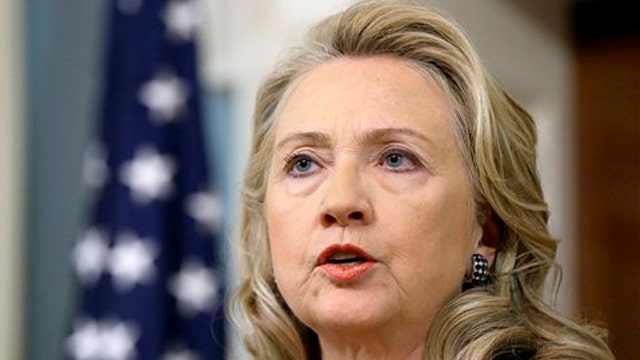Did Hillary Clinton knowingly violate the law?
State Dept.: No record of Clinton signing separation statement
This is a rush transcript from "The Kelly File," March 17, 2015. This copy may not be in its final form and may be updated.
MEGYN KELLY, HOST: Joining us now, the man who first broke this story, Shannen Coffin, former council to Vice President Dick Cheney and a former DOJ civil division assistant deputy attorney general. Shannen, good to see you.
SHANNEN COFFIN, FORMER DOJ ASSISTANT ATTORNEY GENERAL: Hey, Happy St. Patrick's Day.
KELLY: And to you. And so, let's just start where I left off with Juan. The law is clear, separate and apart from OF-109 which now we know she dodged, or they just didn't offer to her, the law is clear. And I refer the audience to 18 U.S. code, section 2071-B, look at it. "Whoever having the custody of any federal record, willfully and unlawfully conceals removes or destroys the same shall be fined or imprisoned or both" and listen -- "and shall be disqualified from holding any office under the United States." If she willfully concealed these emails, not only did she commit a crime, she cannot be president. So the stakes are rather high.
COFFIN: Absolutely. I wrote about that particular statute on National Review online several weeks ago, when this story broke. And it is a statute that quite plainly says that the custodian of a record who Hillary Clinton would be in this case, can't conceal or destroy it. Now, she certainly has a concealment problem when she's hiding the existence of at least 30,000 records. She might have an obstruction problem, given the strange review process that her lawyers went through, which resulted apparently in the deletion of 31,000 records.
KELLY: To people like Juan who continue to say, she committed no crime. There's no evidence she committed a crime. You say what?
COFFIN: Well, there's evidence that would at least raise questions about whether she's committed a crime. That crime depends upon state of mind, which is willfulness, and willfulness requires, A, that you know that what you're doing is wrong, and you know that it's a crime as well.
Now, that's an issue that a prosecutor would have to look into and what evidence you have. But you pointed out some of the evidence that she was basically letting go one of her ambassadors for doing something very similar, setting up a private email system in an embassy.
KELLY: Not only that, but she was a practicing lawyer for many years. She herself is an attorney. She was in the White House for eight years and she was atop the State Department as secretary for four. I mean, to suggest that she had no idea what her obligations were under the federal records act is absurd.
COFFIN: Megyn, the federal records act says that the obligation of the department is actually the obligation of the secretary. The federal records act says the secretary is responsible for preserving all of the records of the agency. It falls on the secretary of state for the Department of State to be the responsible party. So the federal records act is very clear that Hillary Clinton is the one who bore the responsibility under the law.
KELLY: And now there's a question not only about whether she possibly violated section 207-1-B, which we put on the board, but also a statute that makes it illegal to obstruct justice.
COFFIN: Right.
KELLY: And that relates to the deletion of emails. Just concealing them, just keeping them in her house and not offering them for all those years while the FOIA requests were coming in and so on, that could be a crime. But there could be a second crime related to the destruction of the emails which she's admitted she's done. Explain.
COFFIN: Well, that same statute actually deals with concealment as well. But it's concealing or destroying documents for the purpose of evading an official inquiry investigation by an agency, or even the possible investigation. And this was a law that actually passed while Hillary Clinton was in the Senate under Sarbanes-Oxley in 2002, and it is designed to prevent exactly the sort of thing that we're concerned about happening here. It's designed to prevent someone from saying, hey, I know they're after me, or they might come after me, so I better hide or destroy these records. And again, it raises serious questions, and Professor Ronald Rotunda in the Wall Street Journal wrote a very good op-ed about that today.
KELLY: I recommend the op-ed and I certainly recommend everybody read Shannen's pieces as he's been posting on Hillary Clinton for the past week or so. And really thoughtful in-depth writings. And we appreciate your expertise tonight. Shannen, thanks for being here.
COFFIN: Thank you, Megyn.
Content and Programming Copyright 2015 Fox News Network, LLC. ALL RIGHTS RESERVED. Copyright 2015 CQ-Roll Call, Inc. All materials herein are protected by United States copyright law and may not be reproduced, distributed, transmitted, displayed, published or broadcast without the prior written permission of CQ-Roll Call. You may not alter or remove any trademark, copyright or other notice from copies of the content.






















